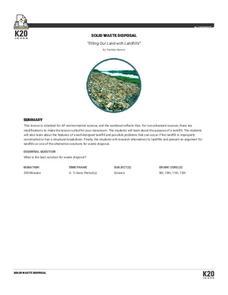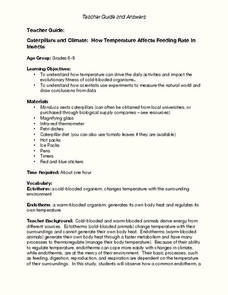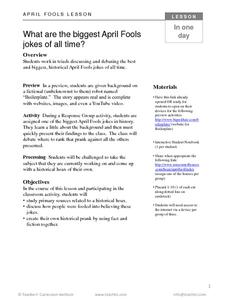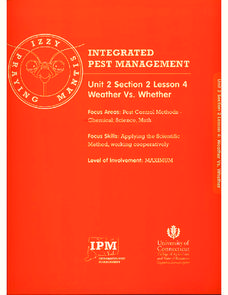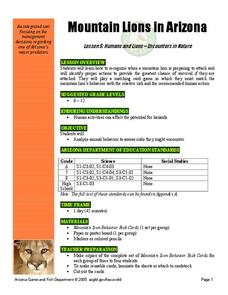K20 Learn
Filling Our Land with Landfills: Solid Waste Disposal
New ReviewThough it comprises only 5 percent of the world's population, the US generates 40 percent of the world's waste. Scholars learn about landfills, their safety, and other solid waste methods. They use experiments and research to learn more....
K20 LEARN
Water We Going To Do? Floodplains And Watershed Management
How has human activity affected Earth's watersheds? An action-packed lesson plan, part of the K20 Center, examines water's ability to go with the flow regardless of what is in its path. Scholars build model watersheds, examine time-lapse...
Cornell University
Fibers, Dyes, and the Environment
Nanofibers can be made through electrospinning or force spinning in order to reduce the negative impact on the environment. Pupils study the role of fibers and dye on the environment through a series of five hands-on activities. Then,...
Baylor College
Heart Rate and Exercise
What is the relationship among the heart, circulation, and exercise? Your class members will explore first-hand how different physical exercises affect an individual's heart rate. They will begin by learning how to measure their own...
Baylor College
HIV/AIDS in the United States
In the final of five lessons about HIV/AIDS, groups create presentations to share data about the infection rates in the United States, examining demographic and geographic trends over the past ten years. Depending on how much time you...
Howard Hughes Medical Institute
Tracking Genetically Modified Mosquitoes
What's that buzzing in your ear? An insightful lesson about genetically modified mosquitoes! Partnered pupils explore the creation, release, and monitoring of mosquitoes designed to reduce the mosquito population. After watching a video,...
Global Oneness Project
Learning with Nature
Think outside the box - and think about education beyond the classroom walls - with a resource that has your critical thinkers watching a video about a nursery in Scotland that lets youngsters roam wild in a forest. Viewers reflect on...
Berkshire Museum
Meet a Naturalist: Researching, Writing, Interviewing
Young scholars reach out into the community and learn about different environmental science careers in this inquiry-based instructional activity. Beginning with a short research assignment, children gain background knowledge about...
Curated OER
Caterpillars and Climate: How Temperature Affects Feeding Rate In Insects
Do you eat more when you are hot or when you are cold? Young scientists observe the eating pace of two caterpillars at different temperatures. The differences in endotherm and ecotherm animals' ability to adjust to temperature change...
Curated OER
Victory in Europe, 1944-1945
Students examine the overall strategy pursued by the Allies in the final moths of World War II in Europe by examining military documents and consulting an interactive map of the European theater.
Cornell University
What is IPM?
Discover what a pest is and how to identify one with a lesson that looks closely at our outside world and taxonomy. Scholars investigate insects and plants to practice their identification skills, take a survey, and explore the...
American Forest Foundation
Who Speaks for the Trees?
Help young conservationists appreciate the important role that trees play in ecosystems around the world with this collection of six engaging activities. From a shared reading and class discussion of Dr. Seuss' The Lorax, to in an depth...
TCI
What Are the Biggest April Fools Jokes of All Time?
After working in groups to analyze primary sources related to a historical hoax, learners will discuss how people managed to be fooled and work to identify one of the biggest April Fools jokes in history.
University of Connecticut
Weather Vs. Whether
Monarch butterfly populations have decreased by 90 percent over the past 20 years due to misuse and ineffectiveness of some pesticides. Given the challenge to increase pesticide safety and effectiveness, the class, through discussion,...
Michigan State University
Preferred Destinations
Pests vacation, too! Here, scholars create travel brochures or posters that inform others about a habitat in which a pest lives. Travel information to be included contains everything from pictures to resort names to slogans down to the...
Boys Town
More Tools for Teaching Social Skills in School
Put an end to wasted instructional time with this lesson on responsibility and preparedness. After completing this series of activities students will learn the importance of these social skills not only in the classroom, but at home and...
Curated OER
Darwin’s Bees
What do you call a bee born in May? A maybe! This first instructional activity in a series of four begins with a starter activity to get scholars thinking about the topic. Then a circus, or circuit of seven activities, show Darwin's...
Curated OER
Mountain Lions in Arizona Lesson 5: Humans and Lions - Encounters in Nature
Fledgling felinologists are taught how to recognize when a mountain lion is preparing to attack. They identify proper actions to provide the greatest chance of survival if they are attacked. Learners play a matching card game in which...
Curated OER
Plate Tectonics: Third Grade Lesson Plans and Activities
Third graders examine plate movements and boundaries with a lab that demonstrates how volcanoes and earthquakes are formed. It presents different types of stresses an object can withstand through a hands-on experiment with clay to...
NASA
Is It Alive?
Determining whether or not something is living can be more difficult than it seems. Put your young scientists to work defining their own criteria to identify life, then work with three samples to see if they are alive or not.
NOAA
Calling All Explorers
Let's get moving! The second installment of a 2-part series of six adventures helps learners take part in individual explorations by sea and by land. After navigating the waters in an informative WebQuest, groups create and hide their...
Chicago Botanic Garden
Personal Choices and the Planet
How big is your footprint? Activity three culminates the series by having groups complete carbon footprint audits with people in their schools and/or around the districts. Groups then gather their data, create a presentation including...
National Park Service
Living & Non-Living Interactions
What better way to learn about ecosystems than by getting outside and observing them first hand? Accompanying a field trip to a local park or outdoor space, this series of collaborative activities engages children in learning about the...
Chicago Botanic Garden
Faces of Climate Change
Sometimes, the best solution to a problem can be found by walking in someone else's shoes. Here, scholars use character cards to take on the roles of people around the world. They determine how their character's life affects our...


